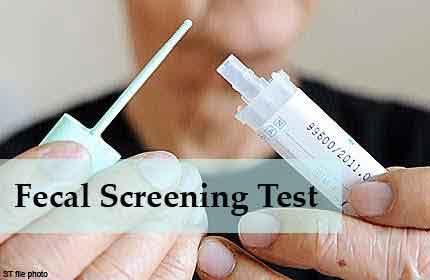- Home
- Editorial
- News
- Practice Guidelines
- Anesthesiology Guidelines
- Cancer Guidelines
- Cardiac Sciences Guidelines
- Critical Care Guidelines
- Dentistry Guidelines
- Dermatology Guidelines
- Diabetes and Endo Guidelines
- Diagnostics Guidelines
- ENT Guidelines
- Featured Practice Guidelines
- Gastroenterology Guidelines
- Geriatrics Guidelines
- Medicine Guidelines
- Nephrology Guidelines
- Neurosciences Guidelines
- Obs and Gynae Guidelines
- Ophthalmology Guidelines
- Orthopaedics Guidelines
- Paediatrics Guidelines
- Psychiatry Guidelines
- Pulmonology Guidelines
- Radiology Guidelines
- Surgery Guidelines
- Urology Guidelines
Patients with positive fecal screening test, sooner is better for colonoscopy

The risk of colorectal cancer increased significantly when colonoscopy was delayed by more than nine months following a positive fecal screening test, according to a large Kaiser Permanente study published in the Journal of the American Medical Association.
"With this study we have strong evidence that a colonoscopy should be performed within several months of a positive fecal screening test," said lead author Douglas A. Corley, MD, PhD, a Kaiser Permanente gastroenterologist and research scientist in Northern California.
The fecal immunochemical test, known as FIT, screens for colorectal cancer by detecting small amounts of blood in the stool. When blood is detected, gastroenterologists perform a colonoscopy to detect and possibly remove cancerous or pre-cancerous polyps before there are any symptoms.
The JAMA study reviewed time-to-colonoscopy for 70,124 Kaiser Permanente members in California between 50 and 75 years old with an average risk for colorectal cancer, who had positive FIT results from 2010 through 2013. About 40 percent received follow-up colonoscopies within one month, 64 percent within two months and 74 percent within three months.
Compared with colonoscopy follow-up times of eight to 30 days, the study found no significant differences in risk for any colorectal cancer or an advanced cancer with colonoscopy follow-up times of two, three, four, six, seven or nine months. By 10 to 12 months, however, the risk of any colorectal cancer increased by approximately 50 percent and the risk of an advanced cancer almost doubled. Waiting longer than 12 months increased the risks even more, to more than double the risk for any cancer and triple the risk for an advanced cancer.
In the study, 3 percent of the people with positive FIT results were diagnosed with colorectal cancer (2,191 total cases). Less than 1 percent of these (601 cases) were advanced cancers. The study results were adjusted for differences between patients who had earlier versus later exams.
The findings should help to alleviate anxiety for people who have a positive FIT result, said Kaiser Permanente gastroenterologist Theodore R. Levin, MD, the study's senior author and clinical lead for colorectal cancer screening in Kaiser Permanente's Northern California Region.
"It is a lot of effort for patients to arrange a colonoscopy, given the need for time off work and scheduling someone to accompany them home," Dr. Levin said. "Our study shows that you should get your colonoscopy done, and you should do it as soon as is feasible, but any time within a few months which is our goal at Kaiser Permanente is reasonably safe based on these data."
Colorectal cancer is the second-leading cause of cancer death in the United States, according to the U.S. Centers for Disease Control and Prevention. The U.S. Preventive Services Task Force recommends that people at average risk be screened with a fecal test every year between the ages 50 and 75, a colonoscopy every 10 years, or flexible sigmoidoscopy every five years. FIT does not require any dietary or medication restrictions and can be completed entirely by mail.
With implementation of annual fecal screening in addition to colonoscopy or sigmoidoscopy screening, Kaiser Permanente continues to meet or exceed the American Cancer Society's target screening rate of 80 percent.
"Until this study, very little evidence was available regarding when colorectal cancer begins to progress," said co-author Joanne Schottinger, MD, chair of the Regional Cancer Committee for the Southern California Permanente Medical Group. "Our research confirms that it is very important for patients to have a colonoscopy within a few months of receiving a positive FIT screening."
You can read the full Article by clicking on the link :
Douglas A. Corley, Christopher D. Jensen, Virginia P. Quinn, Chyke A. Doubeni, Ann G. Zauber, Jeffrey K. Lee, Joanne E. Schottinger, Amy R. Marks, Wei K. Zhao, Nirupa R. Ghai, Alexander T. Lee, Richard Contreras, Charles P. Quesenberry, Bruce H. Fireman, Theodore R. Levin. Association Between Time to Colonoscopy After a Positive Fecal Test Result and Risk of Colorectal Cancer and Cancer Stage at Diagnosis. JAMA, 2017; 317 (16): 1631 DOI: 10.1001/jama.2017.3634

Disclaimer: This site is primarily intended for healthcare professionals. Any content/information on this website does not replace the advice of medical and/or health professionals and should not be construed as medical/diagnostic advice/endorsement or prescription. Use of this site is subject to our terms of use, privacy policy, advertisement policy. © 2020 Minerva Medical Treatment Pvt Ltd